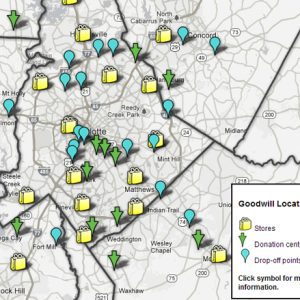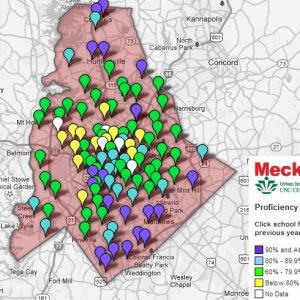Data

Goodwill online resources
There are two new resources on Goodwill’s Regional Indicators partner page – an interactive map of Goodwill locations and the updated Youth Services Catalog. Goodwill Store Locations Map Click here to explore the interactive store and donation map pictured above. Goodwill puts people to work through its chain of retail stores, literally at the stores’ […]

Veterans in Mecklenburg: An infographic
Mecklenburg County is home to one of the largest veteran communities in North Carolina. As one of the Regional Indicators Partners, Goodwill Industries of the Southern Piedmont collaborates with the UNC Charlotte Urban Institute to monitor trends among veterans (and other populations Goodwill serves). The infographic below provides a snapshot of the 55,000 veterans living […]

Carolina metros: Changes in the landscape
In the Carolinas, only Charlotte’s metro area tops 2 million people. Raleigh is roughly half Charlotte’s size at 1.2 million. These two metros have pulled away from the pack of the other Metropolitan Statistical Areas in the Carolinas; no others top 1 million in population. Ten years ago, the metros in the two states were […]

Explore CMS data at the school level
The UNC Charlotte Urban Institute has partnered with MeckEd to provide a series of interactive maps that allow the public to do their own exploration of CMS schools. Those maps have now been combined into a new interface that creates an integrated school data resource. The maps show data on teacher turnover, student suspension rates, […]

Charlotte spends a day learning about data
Understanding the wealth of publicly available data can be both exciting and overwhelming. But plenty of people are eager to try. More than 150 neighborhood organizers, nonprofit leaders, local government staff, academics, and interested citizens gathered Tuesday at UNC Charlotte’s Center City building for the inaugural Charlotte Data Day. Hosted by the UNC Charlotte Urban […]

Commuting in Charlotte region: Where do people work?
According to the U.S. Census Bureau, 153,015 individuals who worked in Mecklenburg County commuted from another county in the Charlotte MSA – among the highest number of county-to-county commuters in the U.S. When deciding where to live or work, a primary consideration is commute time. A shorter commute time allows more time at home or […]

Boundary change boosts Charlotte metro population
In January, the Charlotte metro area population was 1.8 million people. In February, the metro area population was 2.3 million. Where did the half-million people come from? New boundaries were drawn for metropolitan statistical areas. In February 2013, new MSA definitions* took effect. The changes, based on commuting ties among counties, are part of an […]

Charlotte metro: Still high-growth, still strong at core
Of metro areas with more than 1 million people, Charlotte ranked ninth nationally in population growth from 2011 to 2012. That growth was strongest at the center of the metro area, in Mecklenburg County, which outpaced the suburban counties in the region for the second year. Charlotte’s ninth rank in growth came from a list […]

Analyzing water, energy use by neighborhood
Which neighborhoods use the most water in Mecklenburg County? Or electrical power? Digging deeper into the Quality of Life data reveals that patterns of water, natural gas and energy usage vary greatly across the county, with complex relationships to income and home size. Take a look at some of the best information in the country […]

March is Women’s History Month
March is Women’s History Month. Its origins date back more than 30 years, when President Carter proclaimed the second week of March as National Women’s History Week in 1980. Seven years later, as the result of a persistent national lobbying effort, Congress passed a public law designating the month of March as Women’s History Month. […]